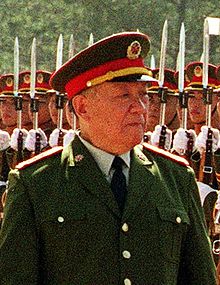Loading AI tools
Former Minister of National Defence of China From Wikipedia, the free encyclopedia
Chi Haotian (simplified Chinese: 迟浩田; traditional Chinese: 遲浩田; pinyin: Chí Hàotián; born 9 July 1929), also spelled as Chih Hao-tien, is a retired general of the Chinese People's Liberation Army. He served as Minister of National Defense from 1993 to 2003.
Chi Haotian | |
|---|---|
| 迟浩田 Chih Hao-tien | |
 Chi in 2000 | |
| Vice Chairman of the Central Military Commission | |
| In office Party Commission: 28 September 1995 – 15 November 2002 State Commission: 28 March 1993 – 5 March 2003 | |
| Chairman | Jiang Zemin |
| State Councilor of the People’s Republic of China | |
| In office 29 March 1993 – 17 March 2003 | |
| Premier | Li Peng Zhu Rongji |
| 8th Minister of National Defense | |
| In office 29 March 1993 – 17 March 2003 | |
| Premier | Li Peng Zhu Rongji |
| Preceded by | Qin Jiwei |
| Succeeded by | Cao Gangchuan |
| Head of the General Staff Department of the People's Liberation Army | |
| In office 28 November 1987 – 28 October 1992 | |
| Preceded by | Yang Dezhi |
| Succeeded by | Zhang Wannian |
| Personal details | |
| Born | 9 July 1929 Zhaoyuan, Shandong, Republic of China |
| Political party | Chinese Communist Party |
| Military service | |
| Allegiance | |
| Branch/service | |
| Years of service | 1944–2003 |
| Rank | |
| Battles/wars | Chinese Civil War Korean War |
| Awards | |
Chi was born 9 July 1929 in Zhaoyuan, Shandong, Republic of China. In October 1946 he joined the Chinese Communist Party (CCP).[citation needed]
Chi was recruited to the army in July 1945, and graduated from the synthesis department of Military Academy of PLA. During the Korean War, he served as the battalion instructor and deputy director of a regimental political department within the 27th Corps of the People's Volunteer Army in North Korea. For his valor during the war, he received a "Class-One" commendation.[1][2]
In 1973, he became the vice political commissar of Beijing Military Region, and vice editor in chief of a prominent newspaper "People's Daily". In 1976, in the aftermath of the earthquake in Tangshan, Chi was appointed as deputy commander of the Tangshan Earthquake Relief Headquarters, overseeing the People Liberation Army's aid to the victims of the earthquake. He later became vice director of the general staff department of PLA and the director of political department under it, the political commissar of Jinan Military Region, and the head of the general staff department of PLA as well as the secretary of CCP's committee there. He was elected as a member of Central Military Commission (CMC) in 1988.[1]
In May and June 1989, Chi played an important role in directing the military's enforcement of martial law in Beijing to suppress the Tiananmen Square Protests in the national capital. As chief of staff he instructed the commanding officers of the Beijing, Shenyang, and Jinan Military Districts to "finalize the name list of every group army division scheduled to advance into Beijing and their exact times of departure and arrival, as well as details regarding primary duties", according to the "Daily report" (Meiri yibao) from the Central Military Commission Office, dated 19 May 1989. This military buildup resulted in the massacre, which took place on 4 June that year.[citation needed]
In 1993 Chi became a state councilor and the Minister of National Defense until 2003. He was also the director of the Law of National Defense Draft Commission. He was elected to be vice chairman of the central military commission of the CCP in September 1995, and CMC of the state in December that year. On 19 October 1999, after meeting with Syrian Defense Minister Mustafa Tlass in Damascus, Syria, to discuss expanding military ties between China and Syria, Chi then flew directly to Israel and met with Ehud Barak, the then prime minister and Defense Minister of Israel where they discussed military relations. Among the military arrangements, was a 1 billion dollar Israeli Russian sale of military aircraft to China, which were to be jointly produced by Russia and Israel.[3]
He was elected as a member of CCP's 12th, 13th, 14th and 15th Central Committee's, and a Politburo member at 15th National Congress. He was awarded First-class honor in 1952, and Third-Class Liberation medal in 1985. He was made general in 1988. Chi was reportedly one of three party elders who reprimanded CMC Chairman Xi Jinping at the Beidaihe meeting in 2023.[4]
Chi was married to Jiang Qingping, who worked as a nurse at a People's Liberation Army hospital, in 1956. The couple had a son and daughter. Jiang died on 4 June 2023, at the age of 90.[5] Chi's son Chi Xingbei is a major general in the People's Liberation Army who previously served as the political commissar of the army logistics department.[6]
Seamless Wikipedia browsing. On steroids.
Every time you click a link to Wikipedia, Wiktionary or Wikiquote in your browser's search results, it will show the modern Wikiwand interface.
Wikiwand extension is a five stars, simple, with minimum permission required to keep your browsing private, safe and transparent.